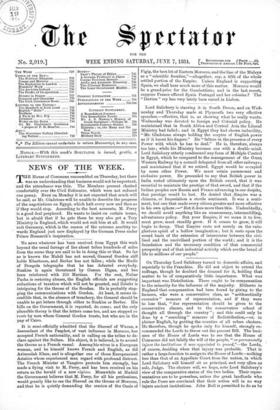Lord Salisbury is starring it in South Devon, and on
Wed. nesday and Thursday made at Plymouth two very effective speeches,—effective, that is, as showing what he really wants. Wednesday was devoted to foreign and Colonial policy. He maintained that in South Africa and Central Asia the Liberal Ministry had failed ; and in Egypt they had shown imbecility, "Mr. Gladstone always holding the sceptre of English power as if it burnt his fingers." He "falters in the presence of every Power with which he has to deal." He is, therefore, always too late ; while his Ministry becomes one with a double mind. Lord Salisbury utterly condemned any form of Multiple Control in Egypt, which he compared to the management of the Great Western Railway by a council delegated from all other railways ; and maintained that if we retired, Egypt would be occupied by some other Power. We must retain paramount and exclusive power. He proceeded to say that British power in India rested ultimately upon the British sword, that it was essential to maintain the prestige of that sword, and that if the Indian peoples saw Russia and France advancing in our despite, that prestige would be lost. He denied that .Empire was a chimera, or Imperialism a sterile sentiment. It was a senti- ment, but one that made every citizen greater and more effective in his own sphere :—" But it does more than this. Undoubtedly, we should avoid anything like an unnecessary, intermeddling, adventurous policy. But your Empire, if we mean it to live, must grow, must steadily grow. If it ceases to grow, it will begin to decay. That Empire rests not merely on the vain- glorious spirit of a hollow imagination ; but it rests upon the sound basis of the extension of intercourse between the civi- lised and the uncivilised portion of the world ; and it is the foundation and the necessary condition of that commercial prosperity and of that industrial activity which are the bread of life to millions of our people."














































